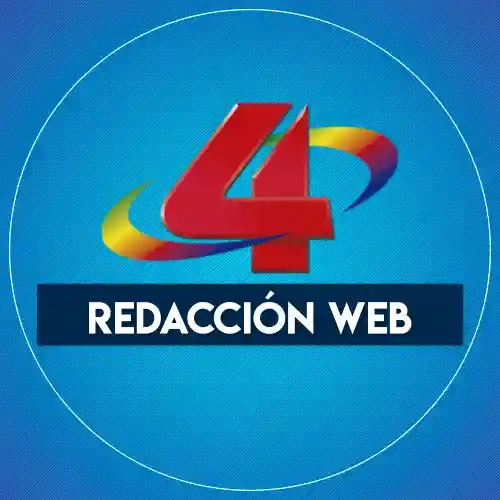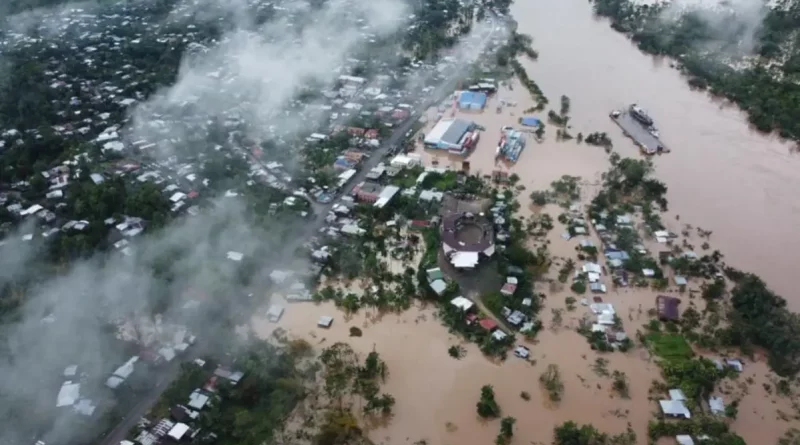La semana pasada, el 13 de octubre, lanzamos una campaña para recaudar fondos de emergencia para apoyar los esfuerzos del gobierno de Nicaragua para reconstruir la infraestructura dañada y apoyar a los millones de personas gravemente afectadas por el huracán Julia.
Puedes donar al Fondo de Solidaridad con Nicaragua “Padre Miguel D’Escoto Brockman”, un proyecto de Alianza para la Justicia Global (AFGJ), para ayudar a las víctimas del huracán.
El huracán tocó tierra en la madrugada del 9 de octubre en la Región Autónoma del Caribe Sur nicaragüense en las zonas de Bluefields, Pearl Lagoon y Tasbapounie. Siguieron lluvias torrenciales que devastaron gran parte del resto del país. Casi cuatro millones de personas en 123 municipios se vieron afectadas en algún grado. Las acciones del gobierno de evacuar a 20.000 personas y ubicar a 12.858 en 33 refugios fue clave para salvar vidas. El Dr. Guillermo González, Director del Sistema Nacional para la Prevención, Mitigación y Atención de Desastres (SINAPRED) señaló que “no se reportaron muertes a causa del huracán. Salvar vidas era la prioridad número uno”.
- También puedes leer: Nicaragua en un mundo multilateral y multipolar
Los reportes iniciales de daños y pérdidas se estiman en US$400 millones de dólares, 2% del PIB, pero esa cifra es preliminar según Iván Acosta, Ministro de Hacienda de Nicaragua, dado los daños a la infraestructura y servicios básicos en zonas como El Rama, Pearl Lagoon y Bluefields aún se están calculando y las pérdidas en los sectores agrícola, pesquero y turístico a nivel nacional también siguen en estudio.
Equipos de especialistas están trabajando las 24 horas para restablecer los servicios básicos de comunicación, electricidad y agua. Paquetes de alimentos y materiales para techos están llegando a familias en El Rama, Bluefields, Corn Island y otros municipios de la Región Autónoma del Caribe Sur.
Esta es la segunda vez que se activa la recaudación de fondos para el alivio de huracanes.
En 2020, se recaudó dinero para los esfuerzos de ayuda y reconstrucción de los huracanes Eta e Iota. La Alianza para la Justicia Global/Nicaragua Network envió $27,500 a SINAPRED, la galardonada y muy reconocida agencia de prevención y mitigación de desastres del país.
- Te puede interesar:Ejército de Nicaragua realiza descargue de ayuda humanitaria en El Rama
El Fondo de Solidaridad con Nicaragua, establecido en 2020 a través de la AFGJ, es una oportunidad para que los ciudadanos estadounidenses apoyen las necesidades del pueblo nicaragüense en un momento en que Estados Unidos continúa violando el derecho internacional al imponer sanciones contra Nicaragua. Estas sanciones, en los últimos años, han impedido que Nicaragua acceda a préstamos en condiciones favorables, subvenciones o alivio de la deuda de fuentes multilaterales como el Banco Mundial, el Banco Interamericano de Desarrollo y el Fondo Monetario Internacional.
Cabe señalar, Estados Unidos aún tiene la responsabilidad moral y legal de cumplir con el fallo de la Corte Internacional de Justicia (Corte Mundial) de 1986. La República de Nicaragua vs. Estados Unidos de América fue un caso donde la Corte Mundial sostuvo que Estados Unidos había violado el derecho internacional al librar una guerra contra el gobierno de Nicaragua utilizando a los Contras para minar los puertos, matar a nicaragüenses y destruir escuelas, centros de salud, torres de electricidad y más. La Corte Internacional falló a favor de Nicaragua y en contra de Estados Unidos ordenando el pago de reparación a Nicaragua. Estados Unidos se negó a participar en el proceso luego que la Corte rechazara su argumento de que la Corte Internacional no tenía jurisdicción para conocer el caso. Estados Unidos también bloqueó la ejecución de la sentencia en el Consejo de Seguridad de Naciones Unidas, impidiendo que Nicaragua obtuviera compensación alguna.
Después que el Frente Sandinista entregara el poder en 1990, el Gobierno sucesor bajo Violeta Chamorro fue presionado por Estados Unidos para que retirara la demanda ante la Corte en 1992. En 1986, los daños a Nicaragua se calcularon en aproximadamente US$17 mil millones de dólares. Treinta y seis años de intereses acumulados hacen que el monto adeudado al país se aproxime ahora a US$160 mil millones.
Indudablemente el Fondo de Solidaridad con Nicaragua no reemplaza esta deuda de los Estados Unidos, pero ofrece una oportunidad para que los ciudadanos estadounidenses reconozcan la responsabilidad de su gobierno y ayuden al Gobierno de Nicaragua para responder a las necesidades de su pueblo.
ENGLISH VERSION
Help Nicaragua Recover from Hurricane Julia!
Last week, on October 13th, we launched a campaign to raise emergency funds to support the Nicaraguan government’s efforts to rebuild damaged infrastructure and support the millions of people who have been severely affected by Hurricane Julia. You can donate to the Nicaragua Solidarity Fund “Padre Miguel D’Escoto Brockmann, a project of the Alliance for Global Justice, to help hurricane victims.
The hurricane made landfall in the early morning hours of October 9th, on Nicaragua’s Southern Caribbean Autonomous Region in the areas of Bluefields, Pearl Lagoon and Tasba Pauni. Torrential rains followed, devasting large parts of the rest of the country. Almost four million people in 123 municipalities were affected to some degree. Government preparedness in evacuating 20,000 persons and placing 12,858 in 33 shelters was key to saving lives. Dr. Guillermo González, Director of the National System for Disaster Prevention, Mitigation and Attention (SINAPRED) noted that “no deaths due to the hurricane were reported. Saving lives was priority number one.”
Initial reports of damages and losses have been estimated at US$400 million, 2% of the GDP but that number is preliminary given that the basic infrastructure and services damages in areas like El Rama, Laguna de Perlas and Bluefields are still being calculated and losses in the agricultural, fishing and tourism sectors nationwide are also still under study, according to Ivan Acosta, Nicaragua’s Minister of Finance.
At present, teams of specialists are working around the clock to restore basic services of communications, electricity and water. Food packages and roofing materials are arriving for families in El Rama, Bluefields and Corn Island and other municipalities of Nicaragua’s Southern Caribbean Autonomous region.
This is the second time that fundraising for the Fund has been activated for hurricane relief.
In 2020, we raised money for Hurricanes Eta and Iota relief and reconstruction efforts on the North Caribbean Coast. AfGJ/Nicaragua Network sent $27,500 to SINAPRED, the country´s award-winning disaster prevention and mitigation agency.
The Nicaragua Solidarity Fund, established in 2020 via the AFGJ, is an opportunity for US citizens to support the needs of the Nicaraguan people at a time when the United States continues to violate international law by placing sanctions against Nicaragua. These sanctions, over the past several years, have prevented Nicaragua from accessing concessional loans, grants or debt relief from multilateral sources such as the World Bank, the Interamerican Development Bank and the International Monetary Fund.
It should be noted that the United States still has the moral and legal responsibility to comply with the ruling of the International Court of Justice (World Court) of 1986. The Republic of Nicaragua vs. the United States of America was a case where the World Court held that the U.S. had violated international law by waging war against the Nicaraguan government utilizing the Contras to mine the harbors as well as kill Nicaraguans and destroy schools, health centers, electricity towers and more. The World Court ruled in favor of Nicaragua and against the United States awarding reparation to Nicaragua. The United States refused to participate in the proceedings after the Court rejected its argument that the World Court lacked jurisdiction to hear the case. The U.S. also blocked enforcement of the judgment by the United Nations Security Council and thereby prevented Nicaragua from obtaining any compensation. The US pressured the post-FSLN government of Violeta Chamorro to withdraw the complaint from the court in 1992.
In 1986 the damages to Nicaragua were calculated at approximately US$17 billion dollars. Thirty-six years of cumulated interest makes the amount due the country more like US$160 billion. Although the Nicaragua Solidarity Fund does not replace the debt owed by the US, it is an opportunity for US citizens to recognize their government´s responsibility and to assist Nicaragua in responding to the needs of its people.
FIRMA: Nan McCurdy
Esta entrada fue modificada por última vez el 20 de octubre de 2022 a las 7:23 PM


